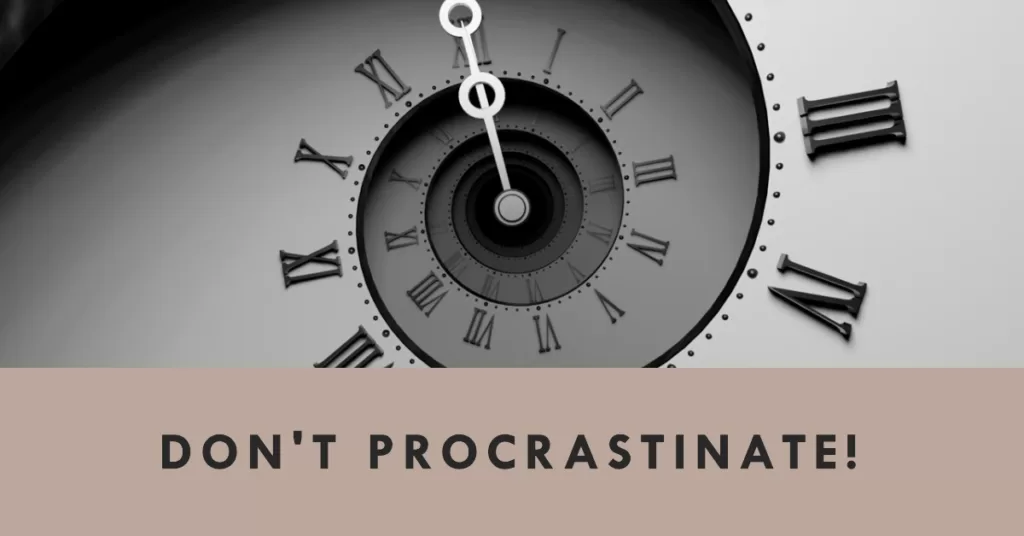Are you struggling with procrastination? Do you find yourself constantly putting off tasks that need to be done? If so, don’t despair. You can learn how to fight procrastination and start taking control of your time. In this article, we’ll look at six steps to help you overcome procrastination and take charge of your day. With the right strategies in place, you’ll be well on your way to breaking free from procrastination and getting more done each day. You can finally get back on track and achieve the goals you’ve set for yourself. Let’s get started!
Table of Contents
Identify Why You’re Procrastinating
You’re likely procrastinating for a reason, so take some time to identify why you’ve been putting off tasks. Is it because the task is too hard or overwhelming? Maybe you don’t have enough resources to complete the task efficiently. It could be that the task seems unimportant or not necessary in your current situation. Or perhaps you just feel unmotivated and lack interest in doing the task.
To better understand why you are procrastinating, ask yourself questions such as ‘What am I afraid of?’ and ‘Am I feeling overwhelmed?’. Taking a few moments to reflect on these questions can help provide clarity into why you’re having difficulty completing tasks. You may also make a list of what needs to get done and break down each task into smaller chunks that are more manageable and less discouraging. This will allow you to focus on one step at a time instead of becoming overwhelmed by looking at all the work ahead of you (more on that in a second).
It’s also important to consider if there are any underlying emotions that may be causing difficulty in getting started with certain tasks or if there is something about them that feels uncomfortable for you. Being aware of how we feel about specific works can give us insight into our own mental blocks when it comes to productivity and motivation levels. Once identified, this awareness can help us find ways to overcome barriers, such as using positive self-talk or finding support from other people who have gone through similar experiences before us.
When it comes to fighting procrastination, being honest with ourselves is key – understanding why we put things off helps us develop strategies for tackling those tasks head-on in an effective way. By addressing our concerns upfront, breaking down large tasks into smaller pieces, and acknowledging any underlying emotions related to these activities, we set ourselves up for success in achieving our goals without letting procrastination get in the way!
Break Tasks into Manageable Chunks
Instead of being overwhelmed by the task at hand, breaking it down into smaller pieces can make it seem much more achievable. This approach to tackling projects or tasks is known as ‘chunking’. Chunking involves breaking a large project into smaller, manageable pieces. By doing this, procrastinators can focus on one portion of the task at a time and complete each section step-by-step. Here are some steps to consider when chunking:
- Identify the goal of the project or task
- Break that goal down into small, actionable steps
- Assign deadlines for each step
- Track progress and adjust timelines as necessary
Chunking helps break down intimidating tasks into more manageable parts, making them more approachable and motivating procrastinators to move forward with their work. It also allows procrastinators to prioritize which sections need their attention first and eliminates the feeling of being overwhelmed by having too many things to do at once. It can also help keep track of progress throughout a project or task so that procrastinators don’t get discouraged along the way if they fall behind schedule or become sidetracked from their goals temporarily.
When using this technique, it’s important for procrastinators to be realistic about what they can achieve in a given amount of time; setting unrealistic expectations only leads to disappointment in oneself and further delays in completing tasks and achieving goals. To avoid this trap, break down larger items into many smaller tasks; for example instead of writing an entire paper all at once assign yourself deadlines for researching topics related to your paper, outlining your ideas, creating rough drafts, etc. This will give you more concrete objectives while still working toward your ultimate goal in an efficient manner without feeling burned out or overwhelmed along the way.
By focusing on one step at a time rather than looking at everything as a whole unit when tackling projects or tasks, procrastinators can better manage their workloads without feeling like they are getting nowhere fast due to a lack of motivation or inability to finish something completely in one go.
Set Realistic Goals
Setting realistic goals for yourself is key to avoiding procrastination and staying on track with your tasks. Having a goal that is neither too difficult nor too easy helps you focus your energy on achieving it instead of becoming overwhelmed or underwhelmed. It’s important to set specific, measurable goals with clear deadlines in order to give yourself the motivation and direction needed to stay focused.
When setting a goal, make sure it is realistic for you given your current circumstances. Consider any external factors that may affect the completion of the task, such as limited time or resources. If the goal seems too challenging or out of reach, break it down into smaller chunks so that it becomes more achievable and manageable as mentioned before. Setting milestones along the way can help keep you motivated and allow you to measure progress toward your ultimate goal.
It’s also beneficial to have an accountability partner when setting goals – someone who can provide support, encouragement, feedback or even just listen when you need it most. Having another person involved gives us added motivation to achieve our goals because we’re less likely to want to let them down if they are relying on us for something.
Pace yourself by planning ahead and allowing enough time for each step of the process while still moving forward with purposeful action each day toward completing your objectives. This will help reduce stress levels as well as minimize distractions from other activities that could lead to procrastination. Stay mindful throughout and take breaks when needed; recharging regularly will ensure greater productivity over longer periods of time which will ultimately lead to success in achieving your desired results.
Eliminate Distractions
To stay focused and make the most of your time, it’s important to limit any distractions that may get in the way. In this day and age, there are countless potential sources of disruption, from smartphones to social media notifications. By taking proactive steps to reduce these distractions, you can significantly improve your productivity and help yourself break free from procrastination.
The first step is to take a close look at what kinds of things are distracting you from getting things done.
Do you find yourself scrolling through Twitter or Instagram when you should be working?
Does an email notification pop up every few minutes? Are you constantly checking your phone for new messages?
Once you have identified the source of distraction, it is time to take action.
One way to reduce digital distractions is by using tools that block certain websites or apps during specific times of the day. For example, using a website blocker like Freedom or Cold Turkey can help keep you away from Facebook or other social media sites while trying to stay productive. Turning off all notifications on your phone can also help minimize disruptions throughout the day.
Finally, setting boundaries with friends and family members is also essential for eliminating distractions. Let them know when it’s okay for them to contact you – such as during lunch breaks – so that they don’t interrupt your work at random times throughout the day. By taking a few simple steps and consciously reducing interruptions, it becomes much easier to focus on tasks without getting distracted by extraneous factors.
Get in the Right Mindset
You can set yourself up for success and make the most of your time by getting into the right mindset. The way you think about procrastination will have a huge impact on whether or not you actually do it. Having an attitude that is more positive and productive can help you stay motivated and get things done. It’s important to recognize that procrastination can be a habit, but also realize that with the right mindset, you can break it.
When faced with tasks that require effort, it’s helpful to remind yourself why doing them is important in the first place. This could mean making a list of rewards or benefits associated with completing each task or simply taking some time to reflect on how successful completion will make you feel in the long run. Achieving success may take some hard work, but understanding why it’s worth it can be an incredibly powerful motivational factor for tackling tough projects head-on.
At last, consider using visualization techniques to help stay focused and achieve your desired outcome faster. Visualizing success has been proven to increase motivation levels as well as reduce stress when faced with challenging tasks. Clearing your mind and visualizing where you want to be at each stage of achieving your goal can help keep the momentum going even during tough times when progress feels like it’s slowing down or coming to a halt altogether.
Reward Yourself for Accomplishments
Celebrate every accomplishment, no matter how small – it’s the key to staying motivated and beating procrastination for good! Rewarding yourself for completing tasks is an effective way to stay on track with your goals. It reinforces a positive reinforcement loop and helps you remain focused on the task at hand.
Rewards can be anything that motivates you and encourages positive behaviors. This could include:
- Intrinsic rewards such as pride in a job well done or personal satisfaction from learning something new.
- Extrinsic rewards such as monetary bonuses, gifts, or treats.
It is important to set realistic goals when considering rewarding yourself for accomplishments so that you do not become overwhelmed or discouraged by the process. Setting achievable goals will help keep you motivated and make it easier to stay on track with your tasks. What’s more, it is important to remember that rewarding yourself should not be used as a substitute for actual work; rather, it should be used after the completion of a task to reinforce good behavior patterns.
When choosing rewards for yourself, consider what will motivate you most effectively in terms of the timeframe and size of the reward. A small reward given immediately after completing a task can have a greater impact than larger rewards given over longer periods of time; similarly, more expensive rewards can often be less motivating than smaller ones due to the higher expectations they create.
However, note that finding out which type of reward works best for you will take some experimentation – but don’t forget: any reward is better than none!
Summary
Doing the hard stuff first can be demotivating, but it doesn’t have to be. You can beat procrastination by breaking large goals into small and manageable tasks, setting realistic goals, eliminating distractions, and getting in the right mindset. Just like a butterfly emerging from its cocoon and taking flight to new heights, you too can conquer procrastination and reach your goals. Don’t let fear keep you rooted in place! Take charge of your life today and soar above the challenges that come your way.




